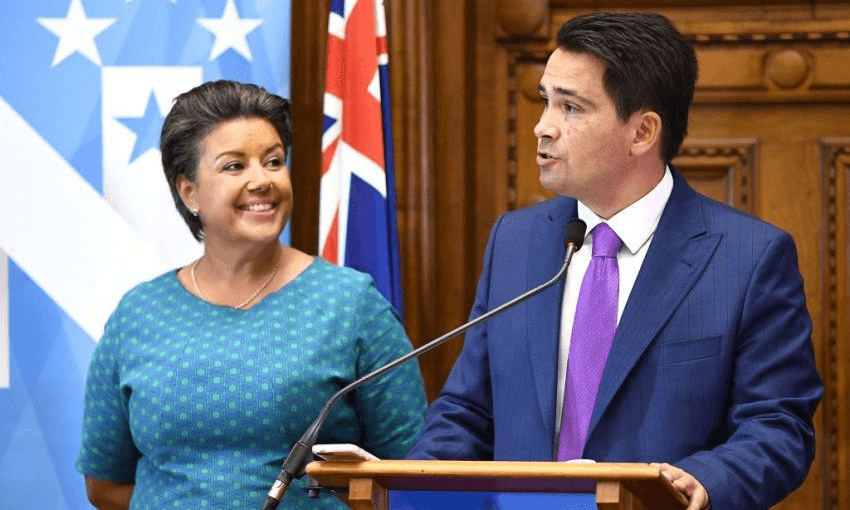On some scores, the National Party is streets ahead on Māori representation. But, asks Morgan Godfery, is it progress?
Every politician keeps a list of regrets, and Labour politicians keep lists longer than most: they were the neoliberals, the foreshore and seabed thieves, and the slowpokes. If things were right and proper Simon Bridges would be the first Māori to lead the National Party, but not the first Māori to lead one of the two major parties. If things were right and proper.
But the world is upside down and inside out. Business leaders are browner than trade union leaders. The leaders of the parliamentary right are entirely Māori – from National and Act to New Zealand First – while the leaders of the parliamentary left are not. “Green caucus” is short for Green caucasian (vote Marama Davidson!). But this isn’t how things were meant to be. I mean, did the parliamentary right ever march for tino rangatiratanga?
Of course not, but their record is compelling: James Carroll (Ngāti Kahungunu), the 12-year-old soldier, would go on to become acting prime minister in 1909 under the Liberals; Āpirana Ngata (Ngāti Porou), the patrician to Carroll’s chauvinism, would become the third-ranking minister in 1928 under the United Party government; and National MPs Rex Austin (Ngāi Tahu) and Ben Couch (Ngāi Tahu) won general seats almost two decades before the left’s Sandra Lee (Ngāi Tahu, Ngāti Toa Rangatira, Ngāti Kahungunu) did the same in Auckland Central.
Then there’s Simon Bridges (Ngāti Maniapoto).
And on the left:
–
–
–
This makes me a little sore, and the worst part of me resents National for beating us to it. “The Maoris get their Maori parties,” a bloke told me a couple of years ago. “And so the white man should get his.”
“I agree,” I said, nodding along. “It’s called the National Party.” Neat, I thought to myself, but under Simon Bridges the line doesn’t come with quite the same sting. I suppose this is the measure of how far things have come, and only 14 years out from Don Brash and his punch drunk speech at Orewa.
This is progress.
But is it false progress? When Māori make it to the top it often obscures how outcomes at the bottom remain more or less the same: schools are made for our Pākehā mates; bosses prefer our Pākehā colleagues; and our Pākehā partners will live longer. The statisticians aren’t going to revise their findings because Simon Bridges is one step from the very top. James Carroll made it to the top more than a century ago, but he did so at the same time thousands of his own relations were dying of preventable disease.
Of course, none of this is to take anything away from Simon Bridges. He’s exceptional. But the meaning of “the first Māori to lead a major party” is self-contained. It’s significant in a parliamentary sense but it loses meaning the further down you go. Even now columnists are working hard to erase how Bridges is different, questioning his blood quantum as if it were 1909 again. But no one is more or less Māori if they lead the National Party, just like no one is more or less Māori if they speak te reo. Or like boil up.
From here, you can spot the difference between the right and left. For the right politics is about making space, whether for the first woman prime minister or the first Māori prime minister. Their identity only matters in so far as it’s a signifier (‘if Simon Bridges can make it, there’s no excuse for Māori who can’t). But for the left politics is about actually making demands for power, sometimes putting leftist Māori offside with voters, colleagues and even comrades.
This puts the shits up parts of the parliamentary left, especially the two generations shaped by their historic losses. First in 1984, when the Labour left lost its party, and again in 2000 – “the winter of discontent” – when Labour’s centrists lost power (if not government) after a confrontation with business. The parliamentary left is conditioned to back down and the first back down is almost uniformly on things Māori.
Remember the foreshore and seabed?
But Simon Bridges changes all this. Weird, I know. But think about it this way: after Simon, and post-Jacinda, can Labour (and the Greens) elect another Pākehā leader? Even today it seems implausible that they would. Labour is catching up with Māori in every sense that it matters – the Māori caucus is larger than any other in the history of the New Zealand Parliament and Māori overwhelmingly endorse Labour’s policies on health, housing and more – but if the party wants the mana of a Māori prime minister they had better start looking for their first Māori leader.
This section is made possible by Simplicity, the online nonprofit KiwiSaver plan that only charges members what it costs, nothing more. Simplicity is New Zealand’s fastest growing KiwiSaver scheme, saving its 12,000 plus investors more than $3.8 million annually in fees. Simplicity donates 15% of management revenue to charity and has no investments in tobacco, nuclear weapons or landmines. It takes two minutes to join.





